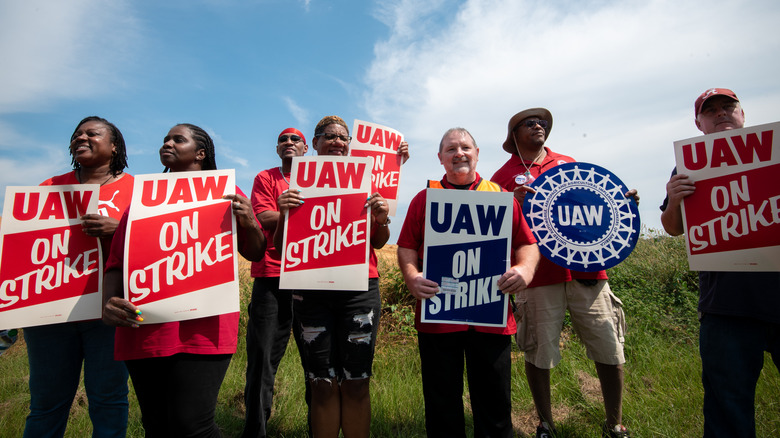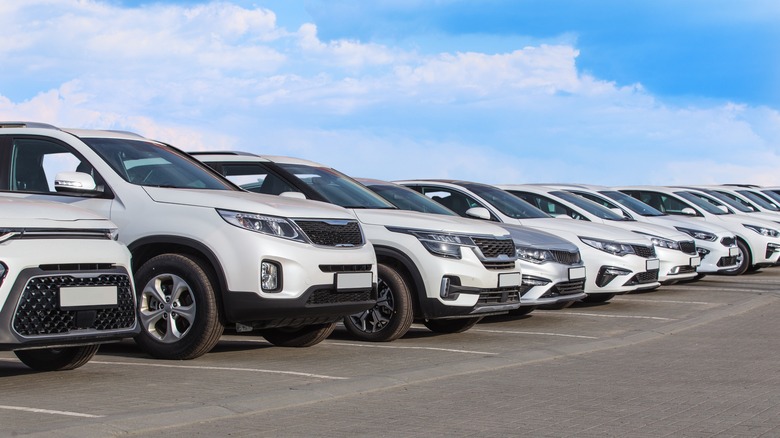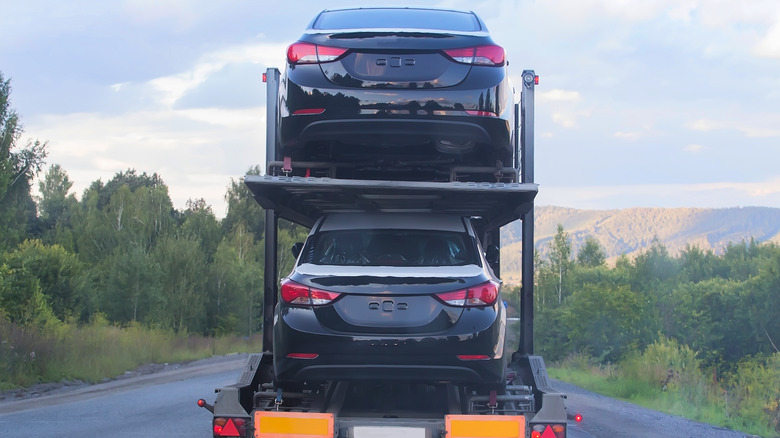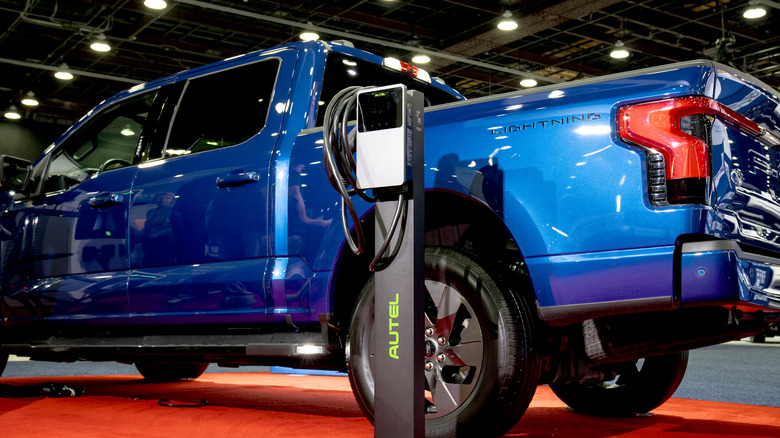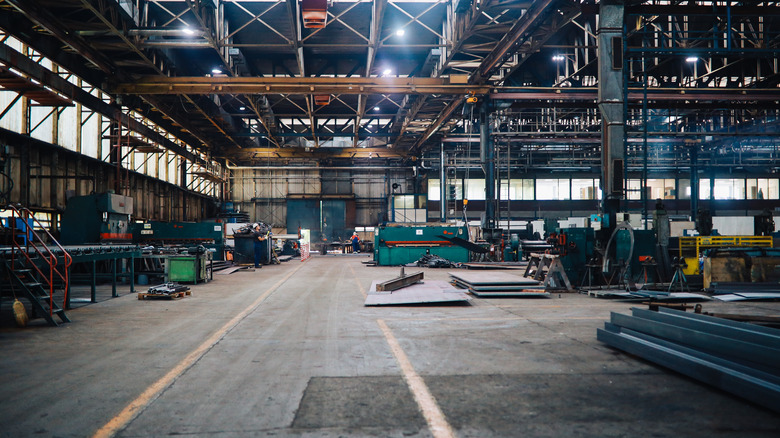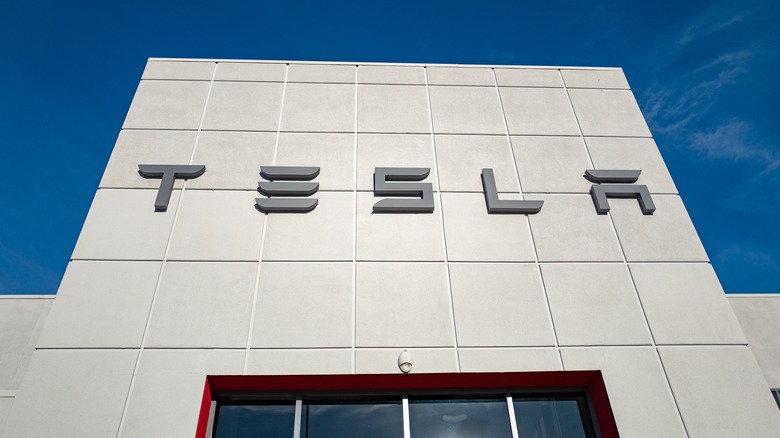8 Ways The UAW Strike Could Impact The US Car Market
The United Auto Workers' strike is nearing the end of its first week, and there's currently no clear view of when the strike will end. On August 27, the UAW overwhelmingly voted to strike against America's Big Three automakers — Ford, General Motors, and Stellantis. On September 15, the contracts between the UAW and the Big Three, which themselves came about after a UAW strike against GM, came to an end.
Currently, the UAW is demanding a few new additions for renewed labor contracts, the major points of which include higher wages, the end of wage tiers, pensions for all, and a 32-hour work week. Though Shawn Fain, the president of the UAW, has called the demands "audacious," he contends that the Big Three have the money to meet them. Meanwhile, Ford has called their offer to the UAW "historically generous," and GM referred to their own offer as "unprecedented."
In contrast to the ongoing WGA and SAG-AFTRA strikes in Hollywood, the UAW strike is likely to be felt closer to home for the average consumer. Across the US car market, there is a wide range of effects that can and will come about due to the UAW strike. Many of the potential effects will grow in terms of severity should the Big Three not be able to reach an agreement with the UAW. Over the coming weeks, months, and even years, there is a particular set of impacts on the US car market to be on the lookout for.
Increased car prices
Perhaps one of the easiest effects to predict is the increased cost of buying a car. Of course, this won't just affect new cars, and this trend will become worse as the strike goes on. Moreover, once the strike reaches its end, it's highly likely that the Big Three will raise prices anyhow, to pay for the increased cost of labor within new agreements, and to avoid cutting costs elsewhere.
The threat also exists of more plants going on strike this Friday, which could lead to higher prices in the near future as dealerships begin to face shortages in inventory. Another issue that could contribute to a lower inventory at car dealerships is panic buying by consumers. Although a number of experts believe that it will take a few weeks for dealerships to start looking empty, once that begins to set in, those dealerships are likely to start selling above the MSRP.
The price of cars from foreign and non-union manufacturers is also likely to go up, in the event that the strike goes on long enough for inventory from the Big Three to become scarce. In that case, companies such as Honda, Nissan, and Tesla would be able to charge more. Over time, this will also begin to affect the price of used cars, which have only just begun to drop after several years of increase.
Fewer options
As mentioned previously, the longer the UAW strike goes on, the more likely it will become that dealerships will begin to run out of certain cars and carry a smaller inventory at any given time. While that will occasionally leave some oddballs on any given dealership's lot, the actual number of choices available for the average consumer will be drastically reduced.
To put things as straightforwardly as possible, the strike will lead to delays in manufacturing. With these delays will come fewer new cars reaching dealerships. This scarcity of supply can limit the choices available to consumers, making it challenging to find specific models, trim levels, or configurations. In some cases, consumers might have to wait longer, or settle for alternative options that may not align with their preferences. While production of every single car made by the Big Three manufacturers isn't currently affected by the UAW strike, the strike continuing, with more factories potentially joining in, would send more models into limbo.
Delays on orders
With production being heavily affected, it should come as no surprise that some cars on order will be delayed for many consumers. This will particularly be an issue for electric vehicles, which are likely to see a host of additional issues arise as a result of the UAW strike. However, all cars with production delays due to the strike will be hit with delays in delivery, and not just to dealerships.
Since 2020, shopping for a car online has become more and more popular among consumers. Unfortunately for customers shopping directly from the manufacturer, some car orders will be delayed due to halts in production because of the UAW strike. Of course, even when manufacturing resumes, this will remain an issue for quite some time due to any number of backorders received between now and the end of the strike that will have to be filled in the order they're received.
Shift in EV timeline and prices
Aside from a delay in delivery on current model electric vehicles produced by the Detroit Three, there's a host of other issues that will affect EVs more widely the longer the UAW strike goes on. A strike that lasts beyond four weeks is likely to push out production timelines for EVs into next year. This comes alongside previous production issues that have already pushed back EVs such as the electric Chevy Silverado.
Beyond shifting the timeline on the rollout of some developing and upcoming EVs, the strike would also increase prices on future models. Perhaps most pessimistic about the future of EVs among the Big Three is a statement made by Ford's CEO, Jim Farley, who said, "Union demands would force Ford to scrap its investments in electric vehicles." Mary Barra, GM's CEO, echoed a similar sentiment in saying that a pay raise for UAW workers would hinder GM's ability to continue manufacturing EVs.
Parts shortage
One of the biggest issues facing the US car market in the midst of the UAW strike is part shortages. Part shortages have been an ongoing issue across the market since the start of the COVID-19 pandemic in 2020, but the strike could send a recovering piece of the puzzle back downward into scarcity. With the manufacturing shutdown, there will be fewer car parts being produced and fewer car parts getting to various mechanics and dealerships throughout the country.
The effects of this shortage will be wide-reaching and could end up being the most significant effect of the UAW strike in terms of how profoundly it will impact various segments of the US car market. Among some dealerships, this issue is even being cited as the bigger concern over a potential loss and shrinkage of some car inventory, due to how long shortages of various parts have been going on.
Longer repair time
The 2019 UAW strike against GM demonstrated an effect that came about due to parts shortages, that being absurdly long repair times. In 2019, there were some who experienced waits upwards of three months for their car to be repaired due to issues in obtaining the necessary parts. However, the UAW strike of today comes at the tail end of pre-existing issues with obtaining parts, which is only bound to make things that much worse.
As it stands, many mechanics are expecting customers to see increased repair times as wait times for parts increase. While the issue has existed to an extent already due to slowdowns in production as a result of the COVID-19 pandemic, the UAW strike and its effects are bound to slow things down even more for the time being. In the current circumstances, the longer the UAW strike goes on, the more likely it is that it will begin to affect just about every repair shop in the country.
Layoffs
One of the more pronounced effects that will come up due to issues with the delivery and manufacturing of parts will be the potential for layoffs. An auto part supplier in Michigan is already planning to lay off 300 employees due to the ongoing UAW strike. With the strike ongoing, it's likely that there will be even more layoffs among part suppliers as time goes on.
Layoffs aren't just affecting the suppliers either. Among the Big Three, thousands of workers have been laid off due to the effects of the strike. GM in particular was forced to shut down a plant in Fairfax, Kansas due to a shortage of parts that would have been supplied by the struck factory in Wentzville, Missouri. Stellantis and Ford have also issued their share of layoffs, with the former announcing layoffs for some 600 non-striking workers at the struck plant in Wayne, Michigan.
Effects on non-union manufacturers
Outside of the Big Three auto manufacturers in America, there are non-union manufacturers, both at home and abroad. The primary one to look out for stateside in the midst of all of this is Tesla. Given Tesla's non-union status, they are likely to see some boon from the UAW strike, as timelines are pushed back for new EV offerings from the Big Three, in addition to price increases at both the retail and manufacturing ends.
Abroad, manufacturers such as Honda, Toyota, and Nissan are also likely to benefit from the UAW strike, with the supply of their vehicles remaining steady for dealerships and, in turn, consumers. In the event of an extended strike, non-union manufacturers will slowly become a more appealing option in a sea of shortages amongst dealerships that sell GM, Ford, and Stellantis vehicles. Of course, as mentioned previously, this too could come with an increased price.
